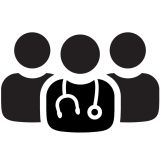In this article:
What is a Healthcare Management Degree?
A healthcare management degree prepares individuals for leadership roles in the healthcare industry, focusing on the administration and operation of healthcare organizations. This degree program teaches students how to manage hospitals, clinics, nursing homes, and other healthcare facilities, ensuring that these organizations run efficiently and provide high-quality care to patients.
The curriculum covers a wide range of subjects, including healthcare policies, finance, human resources, ethics, and law. Students also learn about healthcare systems, quality improvement, and the role of technology in healthcare. Depending on the program, there may be opportunities for hands-on experience through internships or practicums in healthcare settings.
Program Options
Healthcare management degrees are available at various levels, each providing different depths of study and opportunities for career advancement. Here are the main program options:
- Associate Degree in Healthcare Management: This two-year program provides a foundational understanding of healthcare administration, including basic healthcare policies, billing, and management skills. It prepares graduates for entry-level administrative roles in healthcare facilities, such as medical office management or healthcare coordination.
- Bachelor’s Degree in Healthcare Management: A four-year program that covers broader topics such as healthcare systems, ethics, finance, human resources, and law. Graduates are equipped to take on roles like healthcare manager, department head, or health services coordinator in hospitals, clinics, and long-term care facilities.
- Master’s Degree in Healthcare Management: A graduate-level program designed for those aiming for leadership or executive positions in healthcare organizations. This program delves deeper into strategic management, healthcare policy, healthcare law, and finance. Graduates can pursue roles like hospital administrator, healthcare executive, or director of operations in large healthcare organizations.
- Doctorate in Healthcare Management: For those interested in research, teaching, or senior leadership positions, a doctorate offers advanced training in healthcare management. This program focuses on leadership theory, healthcare policy, and high-level organizational management, often leading to roles like Chief Executive Officer (CEO) or professor in healthcare management.
Skills You’ll Learn
A healthcare management degree equips students with a wide range of skills necessary for effectively managing healthcare organizations. Some of the key skills learned include:
- Leadership and Management: Developing leadership skills to manage teams, make decisions, and drive organizational success. This includes conflict resolution, team coordination, and motivating staff in healthcare environments.
- Healthcare Finance and Budgeting: Understanding healthcare financial systems, including budgeting, billing, accounting, and financial planning. Students learn how to manage healthcare funds and ensure that healthcare organizations are financially efficient.
- Healthcare Policies and Regulations: Gaining knowledge of healthcare laws, regulations, and ethical issues. Students learn about compliance with healthcare laws such as HIPAA (Health Insurance Portability and Accountability Act) and other legal requirements for patient care and data management.
- Human Resource Management: Learning to manage the hiring, training, and retention of staff. This includes understanding labor laws, performance management, and creating a positive workplace culture.
- Strategic Planning: Developing skills in long-term planning, implementing strategies to improve organizational performance, and navigating challenges in the healthcare sector.
- Data Analysis and Healthcare Technology: Learning to use technology and data to improve decision-making. This includes using electronic health records (EHR), understanding healthcare informatics, and applying data to improve patient outcomes and operational efficiency.
- Quality Improvement and Patient Safety: Acquiring skills to oversee quality control programs and ensure patient safety. This includes implementing protocols for continuous improvement and monitoring patient care standards.
What Can You Do with a Healthcare Management Degree?
A healthcare management degree opens up a variety of career paths in the healthcare industry, particularly in administrative and leadership roles. Some of the potential career options include:
- Healthcare Administrator: Oversee the daily operations of healthcare facilities such as hospitals, nursing homes, and outpatient clinics. Responsibilities include managing staff, budgeting, and ensuring that the facility operates efficiently while providing quality care.
- Medical and Health Services Manager: Manage specific departments within healthcare organizations, such as a hospital wing, medical office, or clinic. They ensure that operations run smoothly, from scheduling to staffing, and work to improve patient care.
- Healthcare Consultant: Work with healthcare organizations to assess their operations, identify areas for improvement, and recommend strategies for enhancing efficiency and patient care. Consultants often focus on areas like technology implementation, finance, or organizational restructuring.
- Clinical Operations Manager: Oversee the clinical operations of healthcare facilities, ensuring that the clinical staff adheres to procedures and that patients receive high-quality care. This role often involves coordination between doctors, nurses, and other healthcare professionals.
- Patient Services Manager: Responsible for ensuring patients receive excellent care throughout their visit to a healthcare facility. This role includes managing patient flow, addressing concerns, and ensuring patients’ needs are met efficiently.
- Health Information Manager: Specialize in the management of healthcare data, including electronic health records (EHR), medical billing, and compliance with healthcare regulations. They ensure that patient information is accurately maintained and secure.

